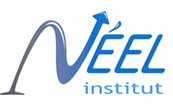- Home
- Institut Néel
- Research teams
- Technical Groups & Services
- Work at the Institut
- Partnerships
Reduced dimensionality structures display specific behaviour enabling the exploration of new physical concepts and the creation of innovative devices for quantum electronics and spintronics.
We strive to control the production and analysis of these original systems at the nanometric scale.
The department’s activity is strongly focussed on the study of micro- and nanomagnetism, spin electronics, molecular and quantum electronics, electronic and structure properties of the surfaces and interfaces and of topological matter.
The study of such systems involves a number of challenges. To meet these challenges, our research teams and technology poles have, over a number of years, worked together to establish state-of-the-art expertise in the development of materials, the production of devices and device analysis using ultra-sensitive measurements. Developments in nanomanufacturing and innovative instrumentation in the fields of mechanics, electronics, cryogenics, ultra-high vacuum, and near field, are the cornerstones of the department’s scientific activity.
QUEST department is highly competent in manufacture of materials and more and more complex’s nanoscale devices. With performance top-down nanofabrication techniques, bottom-up’s approach is increasingly promoted.
QUEST department also developed expertise in advanced instrumentation for nanoscience, including low noise and low temperature electron transport, ultrasensitive optical spectroscopy and near-field microscopy.
The expertise dissemination is encouraged by the clustering of fabrication’s resources and characterization in platform. Our research concerning exploration of new functionalities in fundamental purposes can provide solutions to future device like processing and storage of information, micro-sensitive detectors, photovoltaic, power electronics or electric engine. We value our results by working in partnership with many industrial.
The QUEST department has numerous contributions in education.
Beyond investment of our assistants and full professors to UJF and Grenoble INP and the PhD’s training, the department is involved in two important master of physics in Grenoble: condensed matter physics and radiation (PMCR), Nanoscience and Nanotechnology (N2)
The QUEST department has a significant role in the organizing committee of European schools like the European School On Nanoscience and Nanotechnology (ESONN) and the European School of Magnetism (ESM).
